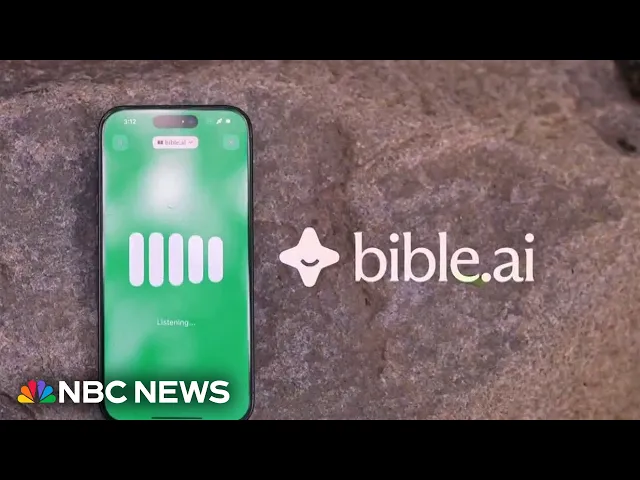Bible.ai claims to help users better understand their faith

AI enters the spiritual domain
Imagine having a personal theological companion that can instantly answer your deepest questions about scripture. That's the promise of Bible.ai, a new tool designed to make religious texts more accessible through artificial intelligence. As AI applications continue expanding into unexpected domains, this latest venture into spiritual territory raises fascinating questions about the intersection of ancient wisdom and cutting-edge technology.
Key developments in religious AI tools
- Bible.ai employs advanced language models to help users explore religious texts through conversational interfaces, potentially making scripture study more accessible to modern audiences
- The tool attempts to maintain theological accuracy by using a curated database of religious scholarship rather than simply applying general AI models to sacred texts
- Religious AI tools highlight the growing tension between technological innovation and maintaining the integrity of traditional spiritual interpretation frameworks
When ancient wisdom meets modern algorithms
The most compelling aspect of Bible.ai is how it represents a fundamental shift in religious knowledge acquisition. Throughout history, understanding scripture typically required either years of theological study or reliance on religious authorities as interpretive guides. AI tools potentially democratize this process, allowing anyone to engage directly with complex religious concepts through natural conversation.
This shift matters significantly in our current context where traditional religious participation continues declining in many Western countries. According to Pew Research data, the percentage of Americans who identify as Christian dropped from 78% to 63% between 2007 and 2021, while those claiming no religious affiliation rose from 16% to 29%. Tools like Bible.ai could represent either a technological lifeline for religious institutions struggling to maintain relevance or, conversely, further diminish the role of human religious leaders by algorithmatically replacing their guidance functions.
Beyond the promotional narrative
What Bible.ai's developers don't adequately address is the profound epistemological question underlying their project: can algorithms truly comprehend spiritual texts designed to transcend literal interpretation? Religious scholars have long emphasized that sacred texts operate on multiple levels—literal, allegorical, moral, and mystical. Even the most sophisticated language models fundamentally process patterns rather than meaning, potentially missing the deeper spiritual dimensions that have traditionally required human discernment.
A relevant comparison is the Jewish tradition of Midrash, which involves continually reinterpreting religious texts through community discussion across generations. This approach explicitly acknowledges that understanding sacred writings is an ongoing, communal process rather than a static body
Recent Videos
How To Earn MONEY With Images (No Bullsh*t)
Smart earnings from your image collection In today's digital economy, passive income streams have become increasingly accessible to creators with various skill sets. A recent YouTube video cuts through the hype to explore legitimate ways photographers, designers, and even casual smartphone users can monetize their image collections. The strategies outlined don't rely on unrealistic promises or complicated schemes—instead, they focus on established marketplaces with proven revenue potential for image creators. Key Points Stock photography platforms like Shutterstock, Adobe Stock, and Getty Images remain viable income sources when you understand their specific requirements and optimize your submissions accordingly. Specialized marketplaces focusing...
Oct 3, 2025New SHAPE SHIFTING AI Robot Is Freaking People Out
Liquid robots will change everything In the quiet labs of Carnegie Mellon University, scientists have created something that feels plucked from science fiction—a magnetic slime robot that can transform between liquid and solid states, slipping through tight spaces before reassembling on the other side. This technology, showcased in a recent YouTube video, represents a significant leap beyond traditional robotics into a realm where machines mimic not just animal movements, but their fundamental physical properties. While the internet might be buzzing with dystopian concerns about "shape-shifting terminators," the reality offers far more promising applications that could revolutionize medicine, rescue operations, and...
Oct 3, 2025How To Do Homeless AI Tiktok Trend (Tiktok Homeless AI Tutorial)
AI homeless trend raises ethical concerns In an era where social media trends evolve faster than we can comprehend them, TikTok's "homeless AI" trend has sparked both creative engagement and serious ethical questions. The trend, which involves using AI to transform ordinary photos into images depicting homelessness, has rapidly gained traction across the platform, with creators eagerly jumping on board to showcase their digital transformations. While the technical process is relatively straightforward, the implications of digitally "becoming homeless" for entertainment deserve careful consideration. The video tutorial provides a step-by-step guide on creating these AI-generated images, explaining how users can transform...
